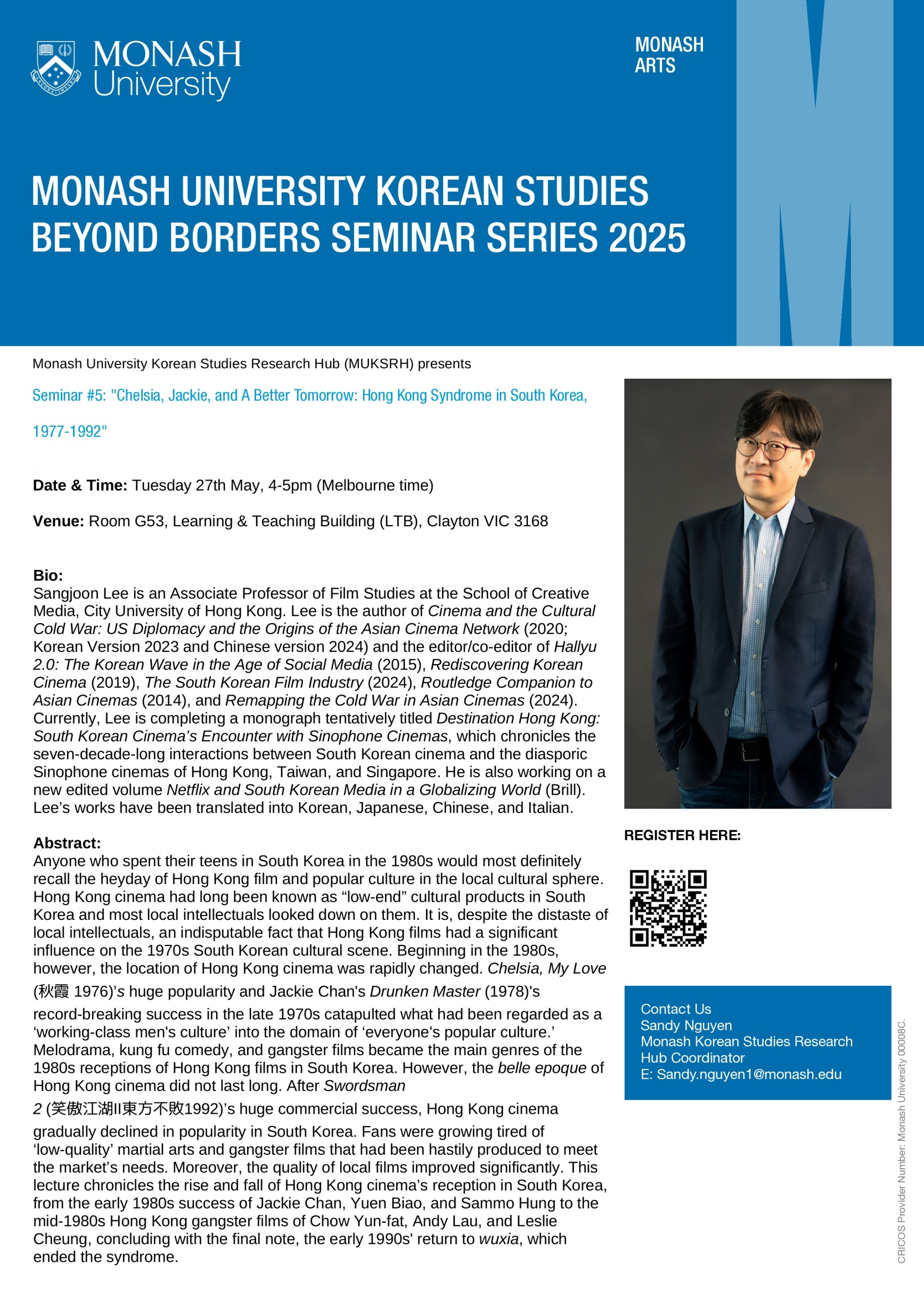time zone will be applied.
Report this post?

Monash University Korean Studies Research Hub (MUKSRH) presents:
Monash Beyond Borders Korean Studies Seminar Series 2024
Seminar 5
'Chelsia, Jackie, and A Better Tomorrow: Hong Kong Syndrome in South Korea, 1977-1992'
Dr Sangjoon Lee (School of Creative Media City University of Hong Kong)
Room G53, Learning & Teaching Building (LTB), Clayton VIC 3168 & via ZOOM
27th May, 4pm Melbourne time
Abstract:
Anyone who spent their teens in South Korea in the 1980s would most definitely recall the heyday of Hong Kong film and popular culture in the local cultural sphere. Hong Kong cinema had long been known as “low-end” cultural products in South Korea and most local intellectuals looked down on them. It is, despite the distaste of local intellectuals, an indisputable fact that Hong Kong films had a significant influence on the 1970s South Korean cultural scene. Beginning in the 1980s, however, the location of Hong Kong cinema was rapidly changed. Chelsia, My Love (秋霞 1976)’s huge popularity and Jackie Chan's Drunken Master (1978)'s record-breaking success in the late 1970s catapulted what had been regarded as a ‘working-class men's culture’ into the domain of ‘everyone's popular culture.’ Melodrama, kung fu comedy, and gangster films became the main genres of the 1980s receptions of Hong Kong films in South Korea. However, the belle epoque of Hong Kong cinema did not last long. After Swordsman 2 (笑傲江湖II東方不敗1992)’s huge commercial success, Hong Kong cinema gradually declined in popularity in South Korea. Fans were growing tired of ‘low-quality’ martial arts and gangster films that had been hastily produced to meet the market’s needs. Moreover, the quality of local films improved significantly. This lecture chronicles the rise and fall of Hong Kong cinema’s reception in South Korea, from the early 1980s success of Jackie Chan, Yuen Biao, and Sammo Hung to the mid-1980s Hong Kong gangster films of Chow Yun-fat, Andy Lau, and Leslie Cheung, concluding with the final note, the early 1990s' return to wuxia, which ended the syndrome.
Bio:
Sangjoon Lee is an Associate Professor of Film Studies at the School of Creative Media, City University of Hong Kong. Lee is the author of Cinema and the Cultural Cold War: US Diplomacy and the Origins of the Asian Cinema Network (2020; Korean Version 2023 and Chinese version 2024) and the editor/co-editor of Hallyu 2.0: The Korean Wave in the Age of Social Media (2015), Rediscovering Korean Cinema (2019), The South Korean Film Industry (2024), Routledge Companion to Asian Cinemas (2014), and Remapping the Cold War in Asian Cinemas (2024). Currently, Lee is completing a monograph tentatively titled Destination Hong Kong: South Korean Cinema’s Encounter with Sinophone Cinemas, which chronicles the seven-decade-long interactions between South Korean cinema and the diasporic Sinophone cinemas of Hong Kong, Taiwan, and Singapore. He is also working on a new edited volume Netflix and South Korean Media in a Globalizing World(Brill). Lee’s works have been translated into Korean, Japanese, Chinese, and Italian.
Register above for a ZOOM link.
Please contact Monash University Korean Studies Research Hub Coordinator, Ms Sandy Nguyen for further details: Sandy.Nguyen1@monash.edu